SIG-SM Events
Workshops
2024
4th Workshop & Research Competition
Becoming Superconnected: Investigating the Process and Experience of Digital Social Interaction
October 26, 2024 | 8:00 am – 12:00 pm | Calgary, Canada |
Organizers: Lingzi Hong (Moderator), University of North Texas, USA; Souvick Ghosh, San José State University, USA; Catherine Dumas, University at Albany, SUNY, USA;
Invited speaker: Dr. Mary Chayko (Rutgers University)
The 4th Annual Workshop on Social Media Research, Challenges, and Opportunities aims to promote discussion and disciplinary convergence on the topic of social media research.
The invited speaker,

Dr. Mary Chayko
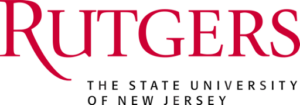
School of Communication and Information, Rutgers University
Dr. Mary Chayko will speak on what it means to be interpersonally “superconnected” in a modern digital society. She will provide an overview of her two decades of qualitative research, comprising over 200 in-depth, open-ended, multi-phase interviews (both electronic and face-to-face) that investigate how digital social connectedness is created, maintained, and experienced. She will discuss how social media, anonymity, and portability impact social interaction, and how digital interaction prompts and illuminates face-to-face interaction. Throughout, Dr. Chayko will provide excerpts from her research and most recent book Superconnected: The Internet, Digital Media, and Techno-Social Life (SAGE Publications, 3rd edition, 2021).
Dr. Mary Chayko is a sociologist, distinguished teaching professor of communication and information, and director of undergraduate interdisciplinary studies for the School of Communication and Information at Rutgers University. She is also an affiliate professor in Rutgers’ departments of Sociology and Women’s, Gender, and Sexuality Studies. Dr. Chayko’s research is on the impact of the internet, social media, and digital technology on community, society, and self. She is the author of four books, most recently Superconnected: The Internet, Digital Media, and Techno-Social Life (Sage, 3rd Edition 2021, with translations in Serbian, Korean, and Turkish), plus many published articles, and speaks nationally and internationally on digital social connectedness and its consequences. She has been honored with the Presidential Award for Excellence in Teaching, and as a Faculty of Arts and Sciences Distinguished Contributor to Undergraduate Education, at Rutgers University.
In the last decade, social media platforms have grown in popularity, and now Facebook, Twitter, and Instagram are readily available on mobile devices, continuously connecting users to a stream of information.
This workshop aims to:
- highlight current social media research opportunities and challenges
- identify and connect social media researchers.
The workshop will be beneficial for advancing our knowledge and understanding of the changing socio-technical landscapes around social media. By bringing together scholars and practitioners from different disciplines, the workshop will facilitate interdisciplinary collaborations and foster new research agendas. Additional registration fee applies.
For registration details: click here
2023
3rd Workshop & Research Competition
Social Media Research, Challenges, and Opportunities
Organizers: Souvick Ghosh, San José State University, USA; Catherine Dumas, Simmons University, USA; Amir Karami, The University of Alabama at Birmingham, USA; Lingzi Hong, University of North Texas, USA
The 3rd Annual Workshop on Social Media Research, Challenges, and Opportunities aims to promote discussion and disciplinary convergence on the topic of social media research focusing on issues related to mis/disinformation, social bots, online communities, and emerging social media platforms. Social media has become a mainstream channel of communication where users create, consume, and exchange information. The ASIS&T community is uniquely positioned as a diverse community of researchers and educators with different backgrounds and expertise. This workshop aims to:
- highlight current social media research opportunities and challenges
- discuss the threats and opportunities of newer social media platforms like TikTok
- identify and connect social media researchers.
- disseminate research findings from the latest papers on social media
- serve as a learning platform for new researchers who are interested in social media.
The workshop will be beneficial for advancing our knowledge and understanding of the changing socio-technical landscapes around social media. By bringing together scholars and practitioners from different disciplines, the workshop will facilitate interdisciplinary collaborations and foster new research agendas. Additional registration fee applies.
For registration details: click here
2022
SIG Social Media:
Half-Day Workshop on Social Media Research, Challenges, and Opportunities
Top Social Media Research Presentation, Invited Speaker
October 29, 2022, 1:00 pm – 5:00 pm; Pittsburgh, PA United States
Registration: https://www.asist.org/am22/22registration/
In the last decade, social media platforms have grown in popularity, and now Facebook, Twitter, and Instagram are readily available on mobile devices, continuously connecting users to a stream of information.
This workshop aims to:
- highlight current social media research opportunities and challenges, and
- identify and connect social media researchers. The workshop includes the following parts:
- Social Media Research Competition (SMRC)
- Invited speaker: Dr. Yu-Ru Lin (University of Pittsburgh)
Top Social Media Research papers
The following social media research will be presented in the workshop and the authors will receive the award:
Important Dates:
Workshop: October 29, 2022, 1:00pm - 5:00pm
Registration: https://www.asist.org/am22/22registration/
Organizers:
Catherine Dumas, Simmons University
Amir Karami, University of South Carolina
Loni Hagen, University of South Florida
Aylin Imeri (Ilhan), Heinrich Heine University Düsseldorf
Tara Zimmerman, University of Texas at Austin
Webinars
Seasonal Webinars on Social Media Research June 29, 11:00 AM-12:00 PM EDT Registration Fee: Free to ASIS&T Members
Social Media Analytics for Information Science and Systems Research: Unveiling Opportunities Through Big Data Insights
Keynote Speaker: Dr. Amir Zadeh, Wright State University, USA
This webinar will showcase the potential of social media analytics using a summary of three research studies. The first study focuses on predicting content popularity and modeling information spread on Twitter. The second study explores the integration of social media and clinical data for improved disease surveillance. Lastly, the third study investigates the alignment between business and social media strategies, unveiling insights through topic modeling and identifying clusters of organizations with varying levels of alignment. These studies offer valuable insights into harnessing the power of social media analytics for research and practical applications. Participants will understand the impact of social media analytics on content popularity and information spread, explore the integration of social media and clinical data for enhanced disease surveillance, and recognize the importance of aligning business and social media strategies.
Amir Zadeh is an Associate Professor of Management Information Systems at Wright State University.
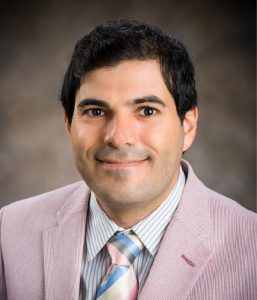 He earned his Ph.D. in Management Science and Information Systems from Oklahoma State University in Oklahoma, USA. He holds degrees in Industrial Engineering (with a concentration in Socio-Economic Systems) and Applied Mathematics (with a concentration in Computer Science). His research and teaching interests are diverse, encompassing data-driven decision making, analytics, big data, and machine learning with applications in various domains such as information systems, healthcare, social networks, cybersecurity, e-commerce, sports, and operations management. His work has been published in esteemed journals including Decision Support Systems, Information & Management, Information Systems Frontiers, and the Journal of Business Analytics, among others. In 2020, he was awarded the Ranyard Medal by the Operations Research (OR) Society in the United Kingdom.
He earned his Ph.D. in Management Science and Information Systems from Oklahoma State University in Oklahoma, USA. He holds degrees in Industrial Engineering (with a concentration in Socio-Economic Systems) and Applied Mathematics (with a concentration in Computer Science). His research and teaching interests are diverse, encompassing data-driven decision making, analytics, big data, and machine learning with applications in various domains such as information systems, healthcare, social networks, cybersecurity, e-commerce, sports, and operations management. His work has been published in esteemed journals including Decision Support Systems, Information & Management, Information Systems Frontiers, and the Journal of Business Analytics, among others. In 2020, he was awarded the Ranyard Medal by the Operations Research (OR) Society in the United Kingdom.
Seasonal Webinars on Social Media Research April 6, 10-11 am EST Registration Fee: Free to ASIS&T Members
To Skimp or to Step in: Does Timely Service Recovery via Twitter Win Customers’ Hearts?
Keynote Speaker: Dr. Pei Xu, Auburn University, USA
Due to the public nature of the interactions and the ability to foster quicker responses than traditional media, social media has become a powerful channel for both travelers to post their trip-related questions and issues, and airlines to build their brand images. Based on the Signaling theory and Expectations-Confirmation theory, we investigate how service recovery via social media impacts airline profitability. After analyzing 6,602,008 customer complaint tweets and 6,884,117 airline replies on Twitter between Jan 2013 and June 2019 for 11 major US airlines, we find that airline service recovery via Twitter does influence profitability, and such influence is stronger for network airlines. The more observers of airline service recovery, the greater the boost of profitability, which suggests a positive microphone effect. Also, airline response is more likely to influence profitability for network airlines than focused airlines.
Pei Xu is George Phillips Privett Associate Professor of Business Analytics at Auburn University. She has been on Auburn faculty since 2014.
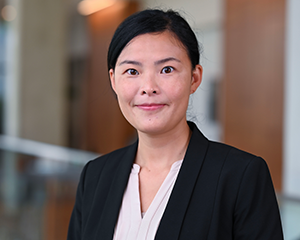
Her research focus is on understanding the economic and social impact of emerging information technology, in areas including online user-generated content, crowdsourcing, social media for e-commerce and healthcare, and FinTech. In her research, a variety of quantitative approaches (e.g., econometrics & causal inference, statistics, machine learning, text mining, data scraping) are leveraged to discover insights from corporate datasets. She has presented her work at numerous conferences and published in high-quality peer-reviewed journals, including several Financial Times' Top 50 Business Journals.
Panels
Date: Tuesday, 01/Nov/2022 (9:30am- 11:00am)
Where: ASIS&T Annual Meeting 2022
Panel speaker:
Miyoung Chong, Chirag Shah, Kai Shu, Jiangen He, Loni Hagen
Abstract:
The circulation of myriad of information from diverse digital platforms during the COVID-19 pandemic caused the unprecedented infodemic. Along with the increased case numbers, the shared information accelerated exponentially, especially via social media, and a large proportion of the daily distributed information was blended with myth, rumors, pseudoscience, or modified facts. Uncovering viral mis- and disinformation narratives and information voids is essential to a swift and effective response on delivering public health information and policy by the governments during a public health emergency. Although many studies have examined how information was circulated and shared during the COVID-19 pandemic era, large gaps in literature exist as to how effectively to track, describe, and answer it. In this panel, the panelists propose and discuss data science methods to analyze the COVID-19 infodemic. We hope our panel contribute to exploring more effective and applicable data science methods to investigate infodemic in crises.
Webinars
Seasonal Webinars on Social Media Research August 4, 10-11 am EST Registration Fee: Free to ASIS&T Members
The Fog of War: Examining the Spread of Dis- & Misinformation in the Russia-Ukraine War on Social Media
Keynote Speaker: Dr. Anatoliy Gruzd, Toronto Metropolitan University, Canada
Ukraine has long been a target for the Kremlin's disinformation campaigns. Since the annexation of Crimea in 2014, Russia has employed a variety of ‘information operation’ tactics to undermine the Ukrainian government and destabilize Ukrainian society. For example, Russia deployed a network of paid internet trolls via the Internet Research Agency to spread disinformation in and about Ukraine. The use of these tactics have only intensified during Russia's invasion of Ukraine in 2022.
The presentation will introduce the ConflictMisinfo.org Dashboard, developed by the Social Media Lab at Toronto Metropolitan University, to monitor online dis- and misinformation about Russia’s invasion of Ukraine. The dashboard captures and visualizes debunked claims from 100s of trusted fact-checkers from around the world. Since the start of the invasion, the dashboard has recorded over 1000 false, misleading and unproven claims related to the Russia-Ukraine war. The second part of the presentation will highlight the results of a new report to be released by the Lab in early July on the Reach of Russian Propaganda and Disinformation in Canada. The presentation will conclude with a number of practical steps to help social media users to detect and limit the spread of dis- and misinformation on this and other topics.
Anatoliy Gruzd is a Canada Research Chair (CRC) in Privacy-Preserving Digital Technologies, a professor at the Ted Rogers School of Information Technology Management and the Director of Research at the Social Media Lab at Toronto Metropolitan University (formerly Ryerson University) He is also a Member of the Royal Society of Canada’s College of New Scholars, Artists and Scientists, and a founding co-chair of the International Conference on Social Media and Society. As a computational social scientist, Dr. Gruzd’s research broadly explores how social media platforms are changing the ways in which people and organizations communicate, collaborate, disseminate information and misinformation, conduct business and form communities online, and how these changes impact society.
Workshops
2021
Date: Tuesday, 2 November 2021 (2:00 PM - 3:30 PM Mountain Daylight Time)
Where: ASIS&T Annual Meeting 2021 (Hybrid)
Panel speaker:
Loni Hagen, Devon Greyson, Ashley Fox, Kolina Koltai, Catherine Dumas
Moderator:
Catherine Dumas
Abstract:
Will follow
Panels
2020
Workshops
Full-Day Workshop & Research Competition
Social Media Research, Challenges, and Opportunities
October 29, 2021, 9 am – 5 pm; Salt Lake City, UT, United States
This full-day workshop aims to promote discussion and disciplinary convergence on the topic of social media research focusing on issues related to pandemic, election, mis/disinformation, and social bots. Social media has become a mainstream channel of communication where users share and exchange information. The ASIST community is uniquely situated in this landscape as a community of researchers and educators who study different issues using social media data.
For invited guests, registration and other workshop details: click here
Registration (includes lunch and two breaks)
ASIS&T AM 2020
Sunday, 1 November
Organizers:
Rachel N. Simons, Texas Woman's University, USA; Loni Hagen, University of South Florida, USA; Colin Rhinesmith, Simmons University, USA; Vivek Singh, Rutgers University, USA; Xiaohua Zhu, University of Tennessee, USA; Abigail Phillips, University of Wisconsin-Milwaukee, USA
SIGs: SIG SI, SIG IEP, SIG SM
Aligning with the theme of the 2020 ASIS&T Annual Meeting, Special Interest Group Social Informatics (SIG SI) will hold its 16th annual symposium in conjunction with SIG Social Media (SIG SM) and SIG Information Ethics and Policy (SIG IEP), allowing for ASIS&T members to better discuss how we might work collaboratively as “change agents actively addressing society’s grand challenges” (ASIS&T, 2020). The purpose of this full-day workshop is to investigate how research and practice focused on the interaction of people, technology, and society may address societal grand challenges, including addressing the United Nation’s 2030 Sustainable Development Goals. Submissions may include empirical, critical, conceptual, and theoretical work, as well as practice cases and demonstrations. This collaborative workshop will consist of interactive panel and breakout sessions throughout the day.
ASIS&T AM 2020
Saturday, 31 October
Organizers:
Rachel N. Simons, Texas Woman's University, USA; Loni Hagen, University of South Florida, USA; Colin Rhinesmith, Simmons University, USA; Vivek Singh, Rutgers University, USA; Xiaohua Zhu, University of Tennessee, USA; Abigail Phillips, University of Wisconsin-Milwaukee, USA
SIGs: SIG SI, SIG IEP, SIG SM
Aligning with the theme of the 2020 ASIS&T Annual Meeting, Special Interest Group Social Informatics (SIG SI) will hold its 16th annual symposium in conjunction with SIG Social Media (SIG SM) and SIG Information Ethics and Policy (SIG IEP), allowing for ASIS&T members to better discuss how we might work collaboratively as “change agents actively addressing society’s grand challenges” (ASIS&T, 2020). The purpose of this full-day workshop is to investigate how research and practice focused on the interaction of people, technology, and society may address societal grand challenges, including addressing the United Nation’s 2030 Sustainable Development Goals. Submissions may include empirical, critical, conceptual, and theoretical work, as well as practice cases and demonstrations. This collaborative workshop will consist of interactive panel and breakout sessions throughout the day. Part 2 will be presented on Sunday, 1 November.
Webinars
April 2, 2020 11-12pm EST
Title: "Disinformation and Fake News: What It Is and How Can We Fight It?"
Organized: SIG SM & South Asia Chapter
In the last few years, we have heard the terms fake news, disinformation, misinformation, etc. repeatedly. Yet, we do not clearly know how to be better informed, fight this phenomenon, or to train people in combating it. With a vast majority of population relatively new to technology, and not trained in any formal way to decipher the real from unreal, truth from half-truths and lies, people actually end up believing disinformation as truth, especially when there is enough repetition.
In this talk, I will describe the phenomenon and its implications, the current efforts and their degree of success, and provide directions for information professionals to fight disinformation and fake news. - Understanding the terms such as fake news, misinformation, and disinformation - Understanding the role of social media in mediating the above - Identifying the steps that can be undertaken to prevent the diffusion of fake news
Presenter
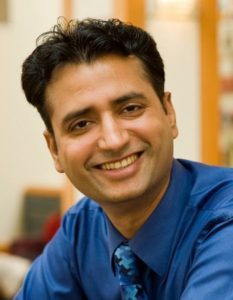 Naresh Agarwal is an Associate Professor and Director of the Information Science & Technology Concentration at the School of Library & Information Science at Simmons University, Boston. He earned his Ph.D. from the National University of Singapore (NUS). Naresh's research area is information behavior and knowledge management — the way people look for information and the contextual factors that impact their choice of information sources. He seeks to understand and synthesize the apparent contradictions in this phenomenon and tries to reconcile multiple perspectives — the user (context, seeking, sense-making, serendipity, avoiding) versus systems/technology, theoretical and empirical studies, and a variety of contexts — office workers, medical residents, LIS students, faculty, librarians, toddlers, etc. His publications span these areas. His book 'Exploring Context in Information Behavior: Seeker, situation, surroundings, and shared identities' was published by Morgan & Claypool.
Naresh Agarwal is an Associate Professor and Director of the Information Science & Technology Concentration at the School of Library & Information Science at Simmons University, Boston. He earned his Ph.D. from the National University of Singapore (NUS). Naresh's research area is information behavior and knowledge management — the way people look for information and the contextual factors that impact their choice of information sources. He seeks to understand and synthesize the apparent contradictions in this phenomenon and tries to reconcile multiple perspectives — the user (context, seeking, sense-making, serendipity, avoiding) versus systems/technology, theoretical and empirical studies, and a variety of contexts — office workers, medical residents, LIS students, faculty, librarians, toddlers, etc. His publications span these areas. His book 'Exploring Context in Information Behavior: Seeker, situation, surroundings, and shared identities' was published by Morgan & Claypool.
Naresh also studies serendipitous information encountering and the causes and effects — both on the receiver and the sender — of information avoidance and non-response behaviors, especially by people who use smartphones and social media. He has been a keynote/invited speaker at workshops and conferences in different countries, including in the U.S., Japan, France, Pakistan, and Bangladesh.
He has held various leadership positions at ASIS&T. He was a member of its Board of Directors, Co-Chaired its Annual Meeting in 2017, and was awarded the ASIS&T James M. Cretsos Leadership Award in 2012. Currently, he is the Chair-elect of SIG KM, Poster Co-Chair for the ASIS&T 2020 Annual Meeting and Advisor to the South Asia Chapter. Prior to entering the doctoral program at NUS, Naresh worked for six years in technology roles in the voice-over-IP, bioInformatics, and digital cinema industries.
Among other things, Agarwal has been a debater and public speaker and likes to paint in watercolor and oil. In 2018, he started an initiative http://www.projectonenessworld.com to gather human stories through interviews to inspire other human stories. You can learn more about him at http://web.simmons.edu/~agarwal.
Workshops
2019
January 28, 2020 11:00 AM - 12:00 PM (EST)
Organized: SIG SM & SIG SI (Emad Khazraee)
Join technologist and digital media scholar An Xiao Mina for a global exploration of internet memes as agents of pop culture, politics, protest, and propaganda on- and offline. Based on her new book, Memes to Movements: How the World’s Most Viral Mediais Changing Social Protest and Power (Beacon Press, January 2019), Mina uses social media-driven movements to unpack the mechanics of memes and how they operate to reinforce, amplify, and shape today’s politics.
Crucially, Mina reveals how, in parts of the world where public dissent is downright dangerous, memes can belie contentious political opinions that would incur drastic consequences if expressed outright. She finds that the “silly” stuff of meme culture—the photo remixes, the selfies, the YouTube songs, and the pun-tastic hashtags—are fundamentally intertwined with how we find and affirm one another, direct attention to human rights and social justice issues, build narratives, and make culture.
Presenter
 An Xiao Mina is author of Memes to Movements: How the World’s Most Viral Media is Changing Social Protest and Power. She leads the product team at Meedan, where they are building Check, a platform for collaboratively verifying news in real time, and Bridge, a platform for translating social media and messaging app content. She is also a co-founder at the Credibility Coalition, an effort to develop a standard for assessing content credibility online, and co-chair of the W3C Credible Web Community Group.
An Xiao Mina is author of Memes to Movements: How the World’s Most Viral Media is Changing Social Protest and Power. She leads the product team at Meedan, where they are building Check, a platform for collaboratively verifying news in real time, and Bridge, a platform for translating social media and messaging app content. She is also a co-founder at the Credibility Coalition, an effort to develop a standard for assessing content credibility online, and co-chair of the W3C Credible Web Community Group.
At Harvard University, Mina is an affiliate researcher at the Berkman Klein Center for Internet and Society and a recent 2016 Knight Visiting Fellow at the Nieman Foundation for Journalism, where she studied online language barriers and their impact on journalism. She has spoken at venues like Creative Mornings, Harvard Law School, the Personal Democracy Forum, and the International Journalism Festival, and she has contributed writing to publications like the the Atlantic, Quartz, Fast Company, and the Economist. With her collective The Civic Beat, she’s exhibited work in spaces such as the Victoria and Albert Museum and the Museum of the Moving Image. She is an advisory editor to Hyperallergic and serves on the board of China Residencies.
November 12, 2019 11:00 AM - 12:00 PM (EST)
Organized: SIG SM & SIG SI (Emad Khazraee)
YouTube is one of the most important platforms for the networked public sphere. The site is a search engine, social network, repository, and alternative to television. Its algorithms also contribute to the formation of filter bubbles and the spread of misinformation. In this talk, "Misinformation in the Networked Public Sphere: The Case of YouTube," Jonas Kaiser will talk about his research on YouTube in Germany, the United States, and Brazil. Based on the example of videos about the Zika virus, Kaiser will highlight the risks of algorithms in the context of misinformation. Learning Objectives: - Participants will learn about filter bubbles on YouTube. - Participants will learn about the case study of health misinformation in Brazilian YouTube - Participants will learn about the risks of recommendation algorithms - Participants will develop a more critical understanding of misinformation in the networked public sphere Presenter
 Jonas Kaiser is an Affiliate at the Berkman Klein Center for Internet & Society and Associate Researcher at the Alexander von Humboldt Institute for Internet & Society. His research is located at the intersection of digital and political communication. Jonas' research interests are online extremism, public sphere theory, online misinformation, and digital methods.
Jonas Kaiser is an Affiliate at the Berkman Klein Center for Internet & Society and Associate Researcher at the Alexander von Humboldt Institute for Internet & Society. His research is located at the intersection of digital and political communication. Jonas' research interests are online extremism, public sphere theory, online misinformation, and digital methods.
He is currently working on a book for Oxford University Press on how the far-right in Germany and the United States is (ab)using the internet's affordances.
Jonas earned his PhD (Dr. phil.) at Zeppelin University for his thesis about climate change skepticism in Germany. His work has been published in journals like International Journal of Communication, Digital Journalism or Environmental Communication and has been featured in U.S. as well as international news media. At Berkman Klein Center, he is heading the Misinformation Working Group.
March 21, 2019, 12:00pm – 1:00pm EST
Social Media Data are currently being used as research data across disciplines and help researchers to gain insights into communication patterns and human behavior. However, much of the content in social media is ephemeral and may change or even disappear over time. Solutions for preserving social media data both for today’s research and future uses are needed – but are difficult to obtain. This talk will give an overview on the current approaches for archiving social media data and will explain some of the most urgent challenges including platform lockdowns and data accessibility and discussions about (research) ethics.
This talk will give an overview on the current approaches for archiving social media data and will explain some of the most urgent challenges including platform lock-downs and data accessibility and discussions about (research) ethics.
Presenter
 Dr Katrin Weller is an information scientist working at GESIS Leibniz Institute for the Social Sciences in Köln (Cologne), Department Computational Social Science. At GESIS, she is head of the team “Social Analytics and Services” and interested in new approaches to using social media in social science research, including documenting and archiving social media data. She is studying social media and online communities, for example in the context of scholarly communication and altmetrics.
Dr Katrin Weller is an information scientist working at GESIS Leibniz Institute for the Social Sciences in Köln (Cologne), Department Computational Social Science. At GESIS, she is head of the team “Social Analytics and Services” and interested in new approaches to using social media in social science research, including documenting and archiving social media data. She is studying social media and online communities, for example in the context of scholarly communication and altmetrics.
Webinars
2018
The 14th Annual Social Informatics Research Symposium: Sociotechnical Perspective on Ethics and Governance of Emerging Information Technologies (SIG SI)
ASIS&T 2018 Annual Meeting
Saturday, November 10, 2018
8:30am–4:30pm at the Hyatt Regency Vancouver, Canada
| PRELIMINARY WORKSHOP PROGRAM | ||
| 8:30 – 9:00 | Introduction and Opening Remarks | |
| 9:00 – 9:45 | Keynote Dr. Mary Gray from Microsoft Research and Indiana University |
|
| 9:45 – 11:00 | Paper Session 1: Ethics and Governance of Algorithms and Artificial Intelligence |
|
| Elliott Hauser | Algorithms, Incorrigibility, and Social Reality | |
| Howard Rosenbaum and Pnina Fichman | The Social Informatics of Algorithmic Accountability | |
| Kayla Hilstob and Muhammad Abdul-Mageed | The Bot Next Door: AI & the Future of Work | |
| 11:00 – 11:15 | Coffee Break | |
| 11:15 – 12:30 | Paper Session 2: Data, Algorithms, and their Ethics and Social Impact |
|
| Janice Mattern and Heather Moulaison Sandy | Use, ethics, and governance of data repositories: A power-sensitive sociotechnical perspective | |
| Theresa Anderson | Data, Design and Democracy – Shaping People-Centred Data Practices | |
| Denice Adkins, Jenny Bossaller, and Heather Moulaison Sandy | Reader-Generated Language and Fiction Publishing | |
| 12:30 – 13:45 | Working Lunch Session | |
| 13:15 – 13:45 | New Format: Discussion Table | |
| Kenneth R. Fleischmann, James Kuhr, Samuel Baker, Chandra Bhat, Tanya Clement, Junfeng Jiao, Matthew Lease, Peter Stone, Sharon Strover, and William Tierney | Introducing a Social Informatics Grand Challenge Project | |
| 13:45 – 14:30 | Best Paper Award | |
| 14:30 – 14:45 | Coffee Break | |
| 14:45 – 16:00 | Paper Session 3: Misinformation and Post Fact |
|
| Loni Hagen, Stephen Neely, Keller Thomas, and Ryan Scharf | Investigating Political Polarization: A Case Study of Trump-Russia Investigation Tweets |
|
| Luanne Freund, Jay Park, Ali Alshehri, and Muhammad Abdul-Mageed |
Towards a framework for characterizing post hoc fact-checking |
|
| Rachel Simons | Supporting Diversity in Collaborative, Technology-Enabled Design Work |
|
| 16:00 – 16:30 | Closing Keynote | |
Panels
SIG SM organized a panel discussion for the ASIS&T Annual Meeting 2018 in Vancouver, Canada on the Challenges for social media: Misinformation, free speech, civic engagement, and data regulations.
The panel discussion took place on Monday, November, 12th from 4:00 PM to 5:30 PM (GMT-7). Visit the ASIS&T website for more infomation. These were the participating speakers:
 Nic DePaula, University at Albany Nic DePaula, University at AlbanyPersonal data processing and targeted advertising—Does the General Data Protection Regulation go far enough? |
| Nic DePaula is a Ph.D candidate in the department of Information Science at the University at Albany, State University of New York. His research interests are in data science, text mining and political communication. Previously, Mr. DePaula has worked with geographic information technologies and information security. His work has appeared in various journals, including Government Information Quarterly, Social Science Computer Review and First Monday. |
 Kaja J. Fietkiewicz, University Düsseldorf Kaja J. Fietkiewicz, University DüsseldorfThe boundary between hate and free speech—What are the risks of the German Network Enforcement Act |
| Dr. Kaja J. Fietkiewicz is post-doctoral research associate at the Department of Information Science, Heinrich Heine University Düsseldorf (Germany). She is a lecturer in information law and statistics as well as mentor for student research projects. Her research interests include smart city development (with focus on e-government), information law (with focus on competition law and data privacy), as well as social media, especially social live streaming services. |
 Thomas J. Froehlich, Kent State University Thomas J. Froehlich, Kent State UniversityFake news, its rapid dissemination and its relation to pseudo-cognitive-authorities |
| Thomas J. Froehlich, Ph.D., is Professor Emeritus, School of Information, Kent State University (27 years). The majority of his publications are concerned with ethical considerations in the information professions, evolving in part from his philosophy background (Ph.D., Duquesne University). Dr. Froehlich currently teaches a course on the Age of Disinformation and has taught in the areas of information science, ethics, online searching, knowledge management and user interface design. He has provided workshops, trainings, seminars or presentations in 26 countries. |
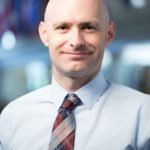 A.J. Million, University of Michigan A.J. Million, University of MichiganCivic engagement and social media use by nonprofit organizations—Does market capture pose a threat to grassroots democratic activity? |
| Dr. A. J. Million is a post-doctoral research fellow at the University of Michigan School of Information. His research pertains to the creation and administration of public and nonprofit information resources. He earned his Ph.D. from the University of Missouri, where his dissertation examined bureaucratic organization and innovation in U.S. state department of transportation websites. |
You can download the slides presented during the panel HERE.
SIG SM organized a panel discussion for the ASIS&T Annual Meeting 2018 in Vancouver, Canada on Politicians & the Public: The Analysis of Political Communication in Social Media.
The panel discussion will take place on Tuesday, November, 13th from 8:30 AM to 10:00 AM (GMT-7). Visit the ASIS&T website for more infomation. These are the participating speakers:
 Juan Pablo Alperin and David Moscrop  Simon Fraser University illustrate his recent research into the best social media channels for promoting scholarly research - Facebook and Twitter.
Why do pundits share scholarly research on social media—and why should we care? |
| Dr. Juan Pablo Alperin is a Director of the Scholarly Communications Lab and an Assistant Professor in Publishing at Simon Fraser University. He uses a combination of computational techniques and innovative methods to investigate how knowledge is produced, disseminated, and used.Dr. David Moscrop is a postdoctoral fellow with the Scholarly Communications Lab at Simon Fraser University, specializing in democracy and decision making. He’s also a writer and political commentator. |
 Catherine Dumas, Simmons University in Boston, MA Catherine Dumas, Simmons University in Boston, MA
Electronic petitioning and social media: Online Collective Action or “Slacktivism”? |
| Catherine Dumas is completing her PhD in Information Science at the University at Albany, State University of New York. She is an Assistant Professor at the School of Library and Information Science at Simmons University in Boston, MA. Her research is motivated by data generated by platforms potentially used for online collective action or digital activism. Using data mining techniques and online collective action theories her work is exploring the impact of new information communication technologies (ICTs) on the phenomenon of online collective action. |

Amir Karami, University of South Carolina Social media and opinion mining in elections – How to track public opinion in social media? |
| Amir Karami is an Assistant Professor in the iSchool of the College of Information and Communications at the University of South Carolina. His research interests are computational social science and and medical/health informatics. He is currently working on developing text-mining techniques and utilizing them for medical, health, and social science. Previously, he was a Data Science Consultant at Washington DC area. |
 Vivek Singh, Rutgers University The newer privacy research challenges in surveillance with social “Big Data” |
| Vivek Singh is an Assistant Professor at Rutgers University and a Visiting Professor at the MIT Media Lab. His work on privacy has been published in leading scientific venues (Science, Proceedings of the IEEE) and has received significant media coverage (BBC, New York Times, Wall Street Journal). |

Hassan Zamir, Dominican University How political elites use, interact and share information on Twitter during recent presidential elections around the world? |
| Dr. Hassan Zamir is a lecturer at the School of Information Studies at the Dominican University (USA). He teaches in the areas of information technology, data science, informatics, and big data. His research interests revolve around social media analytics, big data, and text mining. He plays active leadership roles at the Dominican University and in various professional organizations including the Association for Information Science and Technology (ASIS&T) and the Association for Library and Information Science Education (ALISE). |
